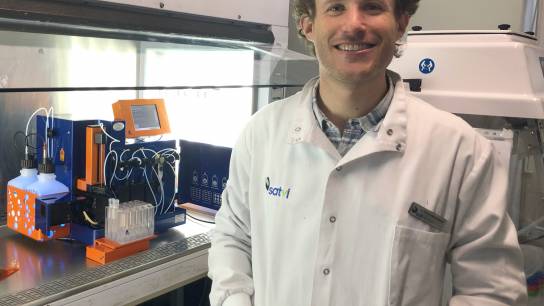
Interview with Simon Mendelsohn, Clinical Researcher at SATVI
Simon Mendelsohn had an interest in working in the medical field already at an early age, shifting between wanting to pursue a career in medical science and working as a medical doctor.
“I had very good role models, three of my grandparents were medical doctors. Especially one of my grandmothers who devoted her life to caring for people with intellectual disabilities inspired me to follow her into a caring profession,” says Simon Mendelsohn.
After Medical School, he worked as a medical doctor in Mpumalanga province of South Africa for a few years. Upon receiving a Rhodes Scholarship, he moved to the UK to do a master’s degree in International Health. As part of this programme, he also completed a diploma in Hygiene and Tropical Medicine with the Royal College of Physicians in London. The course was organized in collaboration with Doctors Without Borders/Médecins Sans Frontières (MSF).
“I had heard about Doctors Without Borders as a student and through my work in South Africa, and had long had a wish to work with them. Their team in London motivated and encouraged me to go after this dream and join the organization,” says Simon Mendelsohn.
After completing his masters, Simon Mendelsohn joined MSF on an assignment to Malawi and worked with a team that implemented a HIV and tuberculosis (TB) treatment programmes in some of the country’s prisons. This experience further motivated him to pursue a career in TB research.
“Despite having access to all the latest TB diagnostics, we could only pick up the people who showed TB symptoms and already had advanced TB. We were not having an effect on transmission, even if we had access to preventive therapy,” he explains.
While Simon Mendelsohn appreciates working with HIV and TB treatment, he says that the experience in Malawi left him feeling that he could have a more lasting impact on the TB pandemic by contributing to research towards either a vaccine or improved TB diagnostics.
After leaving Malawi some five years ago, Simon Mendelsohn joined the South African Tuberculosis Vaccine Initiative (SATVI) and began working towards his PhD, which he aims at completing this summer. The PhD looks at human gene signatures in response to TB and aims at exploring the potential of blood signatures for diagnosing TB, predicting who is likely to develop TB in the near future, and monitoring a patient’s response to their TB treatment. This work is closely related to PredictTB.
In the context of PredictTB, he has worked as a medical doctor at the SATVI site in Cape Town, providing treatment and support to the patients who are involved in the trial. Besides providing treatment, he has also assisted the team at Stellenbosch University, PredictTB’s Coordinating Institute, that is responsible for reading the PET/CT scans that are used in combination with bacterial load markers to try to determine which TB patients are eligible for shortened treatment.
“PredictTB is an incredibly well-organized large-scale study. It is equal parts interesting and rewarding to work in this type of international clinical trial and collaborate with people across many different sites,” says Simon Mendelsohn.
Dedicated to continuing to make a difference for TB patients today and tomorrow, Simon Mendelsohn aims to combine medical work with research also after he has completed his PhD and PredictTB wraps up at the end of July this year.
